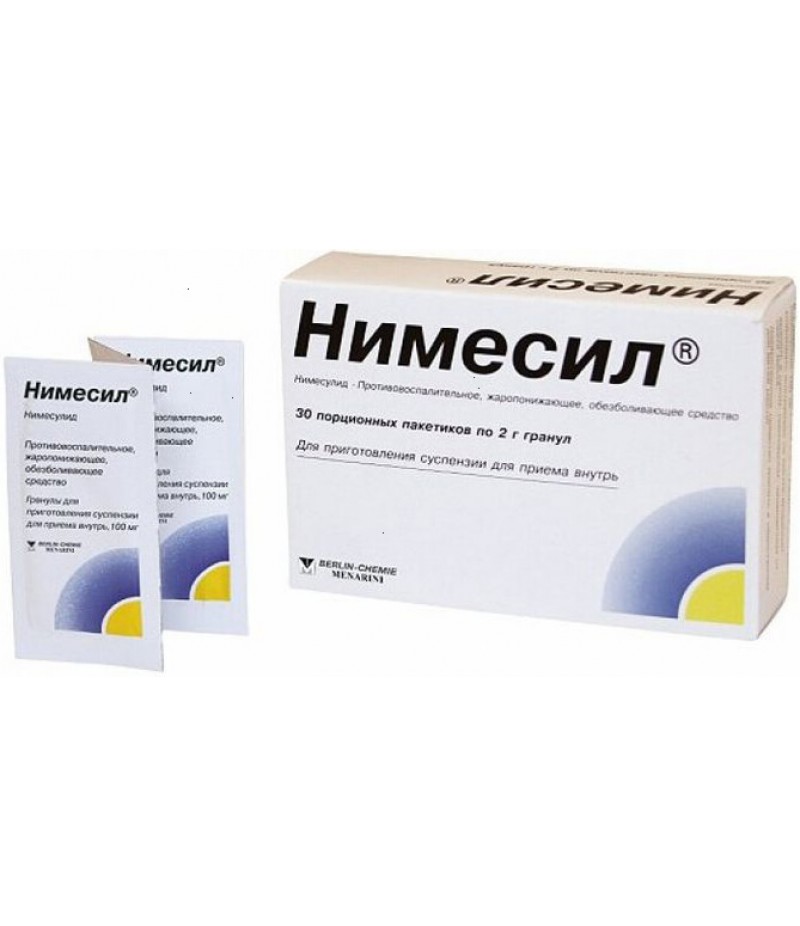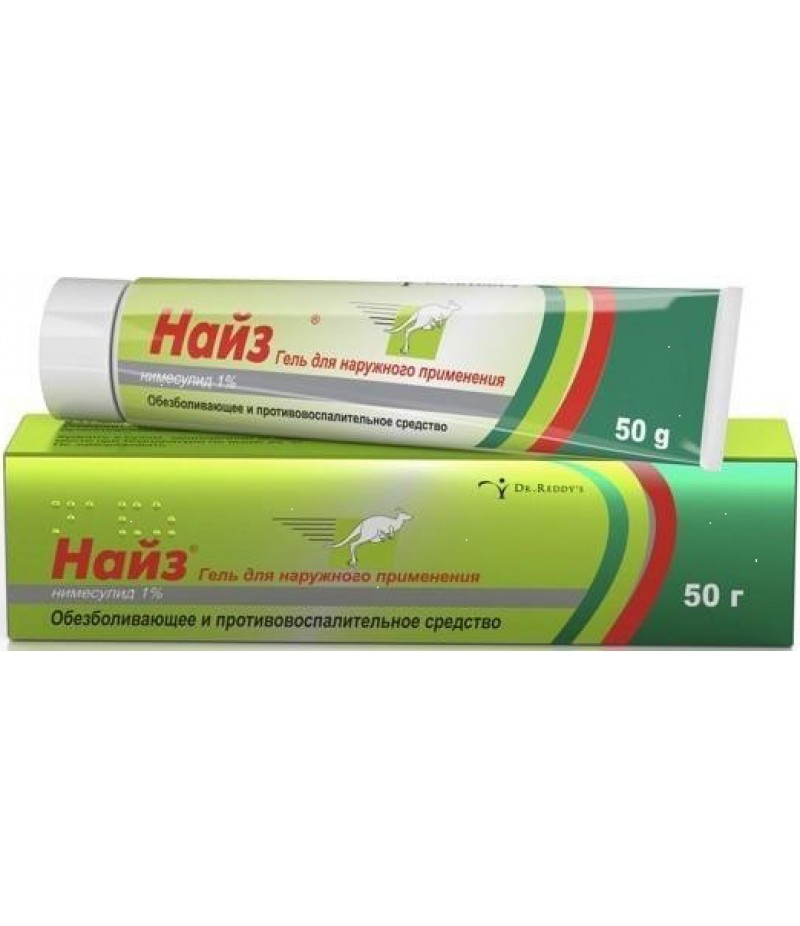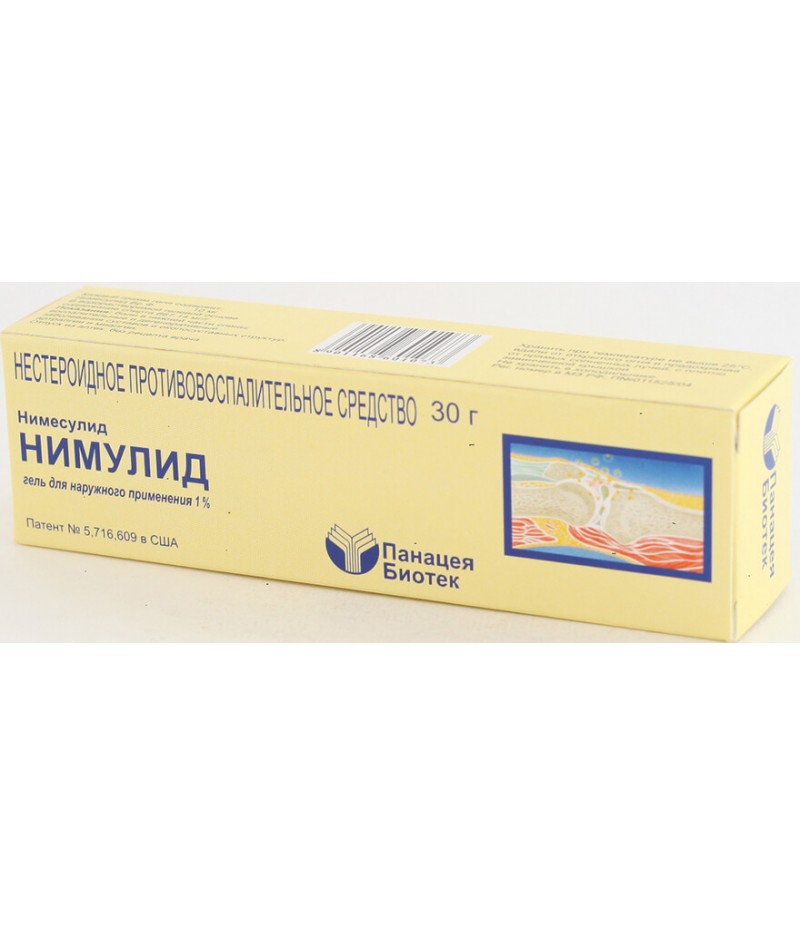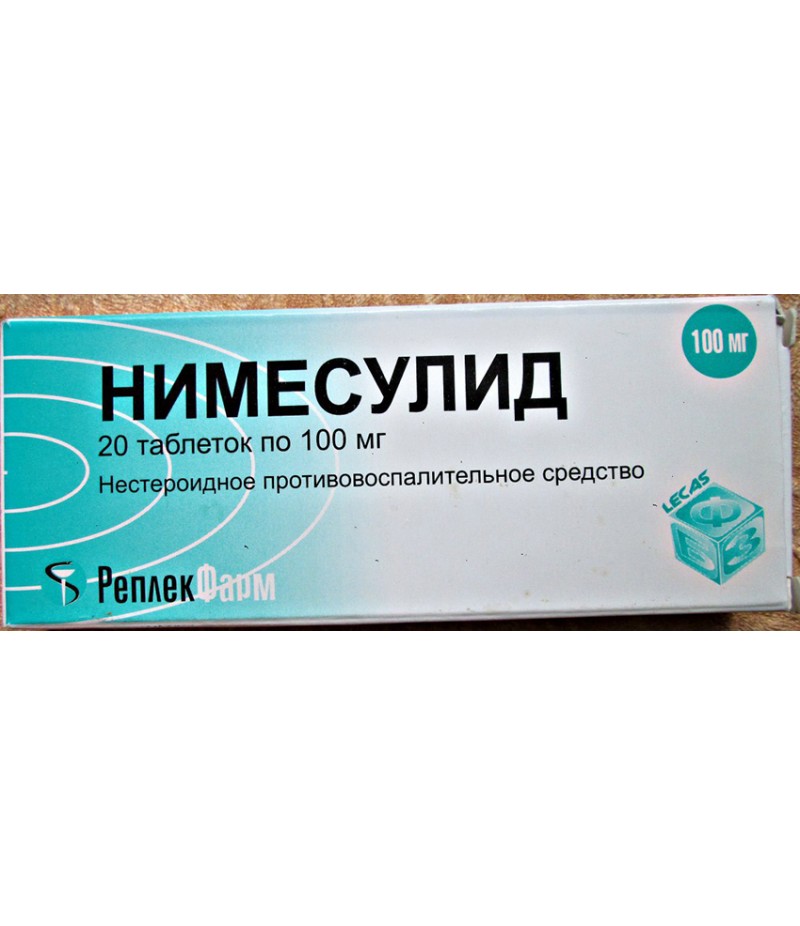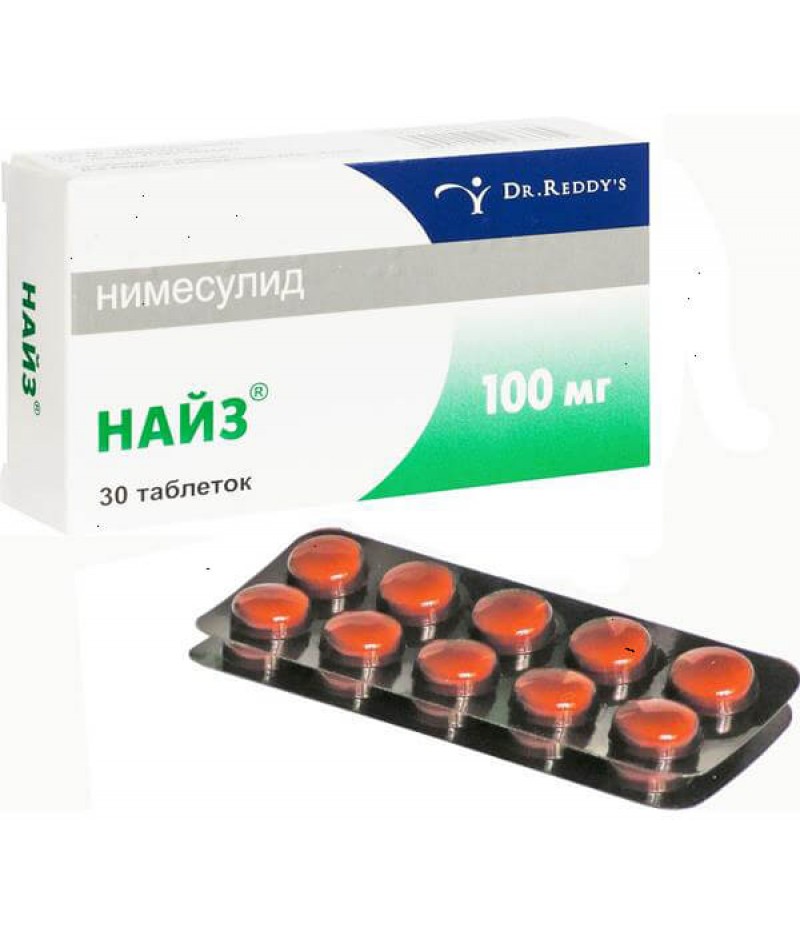Nimesil 100mg 2gr #30
- $39.64
- 3 or more $38.50
- Availability:In Stock
User manual for NimesilReed more and buy Nimesil on this pageComposition of NimesilThe preparation contains nimesulide in the amount of 100 mg per 1 bag.Additional substances: sucrose, ketomacrogol, c
User manual for Nimesil
Reed more and buy Nimesil on this page
Composition of Nimesil
The preparation contains nimesulide in the amount of 100 mg per 1 bag.
Additional substances: sucrose, ketomacrogol, citric acid, orange flavor, maltodextrin.
Form of issue
Medication Nimesil is a granule for making an oral suspension in the form of a light yellow powder with the smell of orange.
2 grams of Nimesil in a paper bag; 9, 30 or 15 bags in a cardboard box.
pharmachologic effect
Antipyretic, anti-inflammatory, analgesic effect.
Pharmacodynamics and pharmacokinetics
Pharmacodynamics
Anti-inflammatory non-steroidal drug from the group of sulfonamides. Has anti-inflammatory, antipyretic and analgesic effect. Wikipedia indicates that the active substance acts as a second type of cyclooxygenase blocker, which is responsible for the biosynthesis of prostaglandins.
Pharmacokinetics
After intake is well absorbed in the intestines, reaching the highest concentration in the blood after 2-3 hours. Reaction with plasma proteins is 97.5%. The elimination half-life is 4-5 hours. Quickly penetrates through the histohematological barriers.
It is transformed in the liver under the action of cytochrome P450. The main active metabolite is hydroxynimidesulide, which is excreted in bile in a glucuronized form. It is excreted from the body, mainly by the kidneys (about half of the dose taken).
Indications for the use of Nimesil powder
The drug serves for symptomatic therapy, relief of inflammation and pain at the time of application.
symptomatic therapy of pain syndrome on the background of osteoarthritis;
relief of acute pain (back and back pain, pain syndrome in injuries, tendenitis, bursitis, sprains and sprains, toothache);
algodismenorea.
Contraindications to Nimesil
hepatotoxic reactions caused by an active substance in the anamnesis;
bronchospasm, urticaria, rhinitis associated with the use of acetylsalicylic acid or other non-steroidal anti-inflammatory drugs in history;
co-administration of drugs with potential hepatotoxicity;
condition after coronary artery bypass grafting;
inflammatory bowel disease (ulcerative colitis, Crohn's disease) in the acute stage;
an increase in body temperature in diseases of an infectious and inflammatory nature;
exacerbation of peptic ulcer, history of ulcer, perforation or bleeding in the organs of the digestive tract;
a combination of bronchial asthma, polyposis of the nose and intolerance of non-steroidal anti-inflammatory drugs;
bleeding cerebro-vascular or other localizations; diseases accompanied by pathological hemorrhage;
Decompensated heart failure;
severe coagulation disorders;
decompensated renal failure, hyperkalemia;
liver disease;
liver failure;
alcoholism, drug dependence;
pregnancy or lactation;
age is less than 12 years;
hypersensitivity to the components of the drug.
Abstract recommends the use of Nimesil with caution if severe forms of type 2 diabetes or hypertension are present; ischemic heart disease, heart failure, dyslipidemia, cerebrovascular disease, peripheral arterial disease, advanced age; peptic ulcer disease in the past, infections associated with Helicobacter pylori; prolonged prior use of non-steroidal anti-inflammatory drugs; decompensated somatic diseases; when smoking and concomitant treatment with anticoagulants, oral glucocorticosteroids, antiaggregants, selective serotonin reuptake blockers.
Side effects
From dental pain, from headache, with a cold, with monthly in medical practice, Nimesil is often used, from which the following side effects may occur:
allergic reactions - sweating, rash, pruritus, erythema, anaphylactoid reactions, dermatitis, urticaria, erythema multiforme, angioedema, Stevens-Johnson syndrome, Lyell's syndrome;
hematopoiesis disorders - eosinophilia, patientopenia, anemia, thrombocytopenia, hemorrhagic syndrome, thrombocytopenic purpura;
visual impairment - blurred vision;
disorders of nervous activity - a sense of fear, dizziness, headache, nightmarish dreams, drowsiness, nervousness, encephalopathy;
circulatory disorders - hot flushes, tachycardia, arterial hypertension, sudden changes in blood pressure;
disorders of the digestive system - nausea, diarrhea, vomiting, flatulence, constipation, abdominal pain, gastritis, dyspepsia, tarry stool, stomatitis, gastrointestinal bleeding, perforation or gastric ulcer, perforation or duodenal ulcer, hepatitis, cholestasis, jaundice, increased levels of hepatic enzymes;
respiratory disorders - dyspnea, attacks of bronchial asthma;
general disorders - asthenia, general malaise, hypothermia;
disorders of the genitourinary system - renal failure, hematuria, urinary retention, dysuria, oliguria, interstitial nephritis;
other disorders - possible hyperkalemia.
Instructions for use Nimesil (Method and dosage)
The preparation in powder (granules) is placed in a glass and diluted in approximately 100 ml of water. The ready-made solution can not be stored, it must be taken as soon as possible. There is a common question: "in what water is the powder dissolved?". The instruction recommends dissolving the medicine in warm, boiled water.
Powder Nimesil, instructions for use
The medicine (after preparation) is taken orally, twice a day for 1 sachet, after meals. The maximum duration of treatment is two weeks.
To reduce the risk of side effects, it is recommended to use the lowest effective dosage for the shortest period of time.
Instructions for use Nimesil for children
Nimesil (like tablets or ointments based on nimesulide) is not allowed for use in children under 12 years of age. Children 12-18 years old are recommended to take standard doses.
Instructions on how to take granules to people with a kidney function disorder
There is no need to change the dose in people with mild to moderate renal failure.
How to take Nimesil powder in elderly patients
In the treatment of elderly patients, the need to change the daily dosage is determined by the doctor, taking into account the possibility of interaction with other medications taken.
Overdose
Signs of an overdose: vomiting, drowsiness, apathy, nausea, pain in epigastrium. It is not excluded the development of gastrointestinal bleeding. In very rare cases, there is a possibility of an increase in blood pressure, the appearance of acute kidney failure, respiratory depression, anaphylactoid reactions, coma.
Treatment of an overdose is symptomatic. There is no selective antidote. If no more than 4 hours have passed since the overdose, it is necessary to rinse the stomach and ensure the intake of enterosorbens, for which use activated charcoal or osmotic laxative. It shows the control of the kidneys and liver.
Interaction
When used simultaneously with glucocorticosteroids, the risk of ulcers or bleeding from the stomach and intestines increases.
When used with antiplatelet agents and selective serotonin reuptake inhibitors, the likelihood of bleeding from the stomach or intestines also increases.
Anti-inflammatory nonsteroidal drugs can enhance the effects of anticoagulants, so this combination is not recommended for people with severe coagulation disorders. If this combination can still be avoided, careful monitoring of blood coagulation should be carried out.
Anti-inflammatory non-steroid agents can weaken the effects of diuretics.
Nimesulide is able to temporarily lower the evacuation of sodium and potassium under the influence of Furosemide and thereby weaken the diuretic effect of the latter. It should also be remembered that such a joint prescription of medicines requires caution in persons with impaired renal and cardiac function.
Anti-inflammatory nonsteroidal drugs can weaken the action of antihypertensive agents. In individuals with compensated renal failure, concomitant administration of ACE blockers, angiotensin II receptor antagonists, or cyclooxygenase suppressing agents, progression of renal impairment and the development of reversible renal failure in acute type are possible.
Anti-inflammatory non-steroidal agents reduce the clearance of lithium, which causes an increase in the level of the latter in the blood.
When Nimesil is prescribed less than a day before or after the administration of Methotrexate, care should be taken, as in such cases the content of Methotrexate in the blood and its toxic effects may increase.
Nimesulide is able to stimulate the nephrotoxicity of cyclosporins.
Terms of sale
To buy Nimesil you don't need a prescription.
Storage conditions
Store in a dry, dark place at room temperature. Keep away from children.
Shelf life - 2 years.
special instructions
Side effects can be minimized by using the lowest effective dosage of the drug in a minimally short course.
The drug in Nimesil powder should be used with caution in individuals with gastrointestinal illnesses in the anamnesis, since the aggravation of these diseases is not ruled out.
Since the drug is partly evacuated by the kidneys, its dosage for people with impaired renal function should be reduced depending on the volume of urination.
At the appearance of the first symptoms of liver damage (itching, yellowing of the skin, nausea, abdominal pain, vomiting, darkening of the urine, increasing the content of "liver" transaminases), it is necessary to stop taking the medicine and see a doctor.
If any signs of visual impairment appear during therapy with the drug, the patient should be examined by the oculist.
Nimesil is capable of provoking fluid retention in the body, so people with high blood pressure and heart disease should be treated with extreme caution.
If symptoms of an acute respiratory infection of a viral nature occur during the treatment with the drug, Nimesil intake should be stopped.
Do not use Nimesil at the same time as other non-steroidal anti-inflammatory drugs.
Nimesulide is able to change the characteristics of platelets, so you need to be careful when using the drug in patients with hemorrhagic diathesis. It is worth remembering that the medicine does not replace the preventive effect of acetylsalicylic acid in diseases of the circulatory system.
Nise or Nimesil - which is better?
Nise and Nimesil are analogues. The main difference between the drugs is that the first is available in the form of a gel for topical application and tablets, and the cost of Nise is an order of magnitude lower. The choice should be based on the doctor's recommendations, the type of evidence and economic considerations.
Nimesil for children
Nimesil (like tablets or ointments based on nimesulide) is not allowed for use in children under 12 years of age. The instruction for the preparation for children indicates that the method of applying Nimesil (how to apply and how to dilute the powder) in the remaining age groups is not different. How to apply the powder, how to dilute Nimesil in powder, and also how to drink Nimesil in powder, described in the section "Instructions for the use of Nimesil (Method and dosage)"
Can Nimesil be given to children at a temperature of?
This drug is not a drug of choice for lowering body temperature, although it has a mild antipyretic effect. Nimesil should be used only for the purposes of arresting a weak and moderately mild pain syndrome.
Compatibility with alcohol
Nimesil and alcohol are incompatible, since both substances are hepatotoxic. Their simultaneous administration can lead to severe disorders of the liver and irreversible consequences, especially against the background of already present diseases of the hepatobiliary system.
Nimesil during pregnancy and lactation
Use the drug during pregnancy or breastfeeding is strictly prohibited, since nimesulide and other anti-inflammatory non-steroid drugs can adversely affect the course of pregnancy and child development.
Reviews of Nimesil
With toothache and other types of pain (associated with trauma, algodismenorrhea), Nimesil powder is widely used. Comments on its use among patients have a positive color and a small amount of evidence on the development of unwanted effects.
The doctors' comments about Nimesil also characterize the drug as a tool that effectively removes traumatic pains and pain localized in the locomotor apparatus. However, it is worth remembering that in a number of countries preparations of nimesulide are completely banned due to increased hepatotoxic ability.
Nimesil is an antibiotic or not?
A frequent question among patients. Nimesil is not an antibiotic and does not have antibacterial action. Its main effects are: antipyretic, analgesic, anti-inflammatory.

